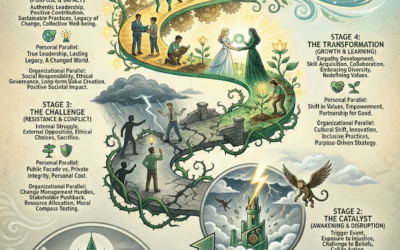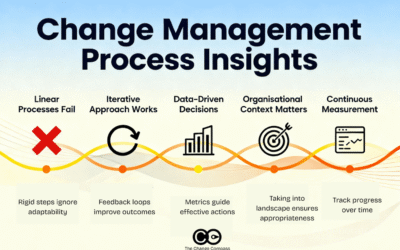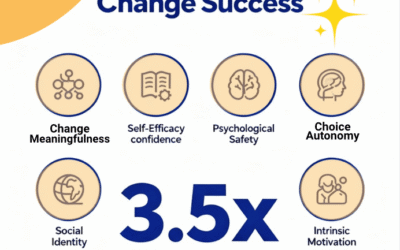Adopting a behavioural science approach to managing behaviour change means leveraging scientific research about human behaviours and using this to better manage employee behaviour and change. A lot of the common practices in change management are not always based on scientific research. What is assumed as common change approaches may in fact not be substantiated by research and data.
A behavioural science approach to managing change recognizes that successful change initiatives require more than just new processes or training programs—they hinge on shifting employee behaviour and embedding new behaviours across the organization. By drawing on evidence-based insights, such as the transtheoretical model, change practitioners can better understand how individuals move through stages of personal growth and adopt new ways of working. This approach underscores the crucial role of leadership, with the executive team and direct reports acting as role models who demonstrate and reinforce desired behaviors. Engaging small groups and the wider workforce in the process ensures that behavioural change is not only top-down but also authentic and sustainable, addressing the way people perceive and respond to organizational change over the long term.
Moreover, involving employees in both the design and reporting of change efforts fosters ownership and helps weave multiple changes into the fabric of the organization. Performance reviews and ongoing reinforcement are essential for sustaining new behaviors and achieving better outcomes. By prioritizing human-centric design and leveraging the power of relationships—such as the nature of leadership relationships and the influence of peer networks—organizations can create an environment where behavioural change is not just a one-off initiative but a continuous process aimed at long-term success.
How to create a behavioral and cultural shift?
To create a behavioural and cultural shift, engage stakeholders through open communication, set clear objectives, and model desired behaviours. Encourage feedback and recognize progress to reinforce the change. Additionally, provide training and resources to support individuals as they adapt, ensuring a cohesive transition towards the new culture.
We talk to an industry veteran of behavioural science, Tony Salvador. Tony has 30+ years of research background behind him and a long-time ex-Inteller and Senior Fellow. At Intel, Tony travelled around the globe researching human factors and how people behave with technology.
There are many valuable takeaways for the change practitioner.
Some of these include:
- Engineering psychology and human centric design
- Analogy of pickaxe and the change approach
- Principle of aversion to loss
- People involvement and transactional change
- Determining the nature of leadership relationship with employees
- Story telling and insight into change culture
- Example of Brazilian translator and people’s stories
- Power of observation and listening
- The nature of relationships and how they determine change
- Change rationale in weaving in multiple changes
- Involving people in reporting to achieve authenticity
- Building the case and involving employees to derive case for change






